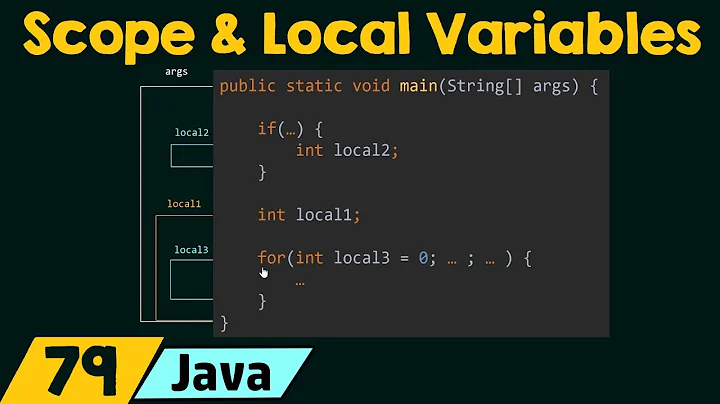Scope of Local Variables in Shell Functions
Solution 1
Shell variables have a dynamic scope. If a variable is declared as local to a function, that scope remains until the function returns, including during calls to other functions.
There are two exceptions:
-
in ksh93, if a function is defined with the standard
function_name () { … }syntax, then its local variables obey dynamic scoping. But if a function is defined with the ksh syntaxfunction function_name { … }then its local variable obey lexical/static scoping, so they are not visible in other functions called by this. -
the
zsh/privateautoloadable plugin inzshprovides with aprivatekeyword/builtin which can be used to declare a variable with static scope.
ash, bash, pdksh and derivatives, bosh only have dynamic scoping.
Solution 2
It isn't a bug, the call inside the context of the outerFunc uses that local copy of $var. The "local" in outerFunc means the global isn't changed. If you call innerFunc outside of outerFunc, then there will be a change to the global $var, but not the outerFunc's local $var. If you added "local" to innerFunc, then outerFunc's $var wouldn't be changed - in essence, there'd be 3 of them:
- $global::var
- $outerFunc::var
- $innerFunc::var
to use Perl's namespace format, sort of.
Solution 3
In function innerFunc() the var='new value' wasn't declared as local, therefore it's available in visible scope (once the function has been called).
Conversely, in function outerFunc() the local var='initial value' was declared as local, therefore it's not available in the global scope (even if the function has been called).
Because innerFunc() was called as a child of outerFunc(), var is within the the local scope of outerFunc().
man 1 bash may help clarify
local [option] [name[=value] ...]
For each argument, a local variable named name is created, and assigned value. The option can be any of the options accepted by declare. When local is used within a function, it causes the variable name to have a visible scope restricted to that function and its children. ...
The implied behavior that's expected in the description could be achieved by declaring local var='new value in function innerFunc().
As others have stated, this is not a bug in the bash shell. Everything's functioning as it should.
Solution 4
You can use a function to force local scope:
sh_local() {
eval "$(set)" command eval '\"\$@\"'
}
Example:
x() {
z='new value'
printf 'function x, z = [%s]\n' "$z"
}
y() {
z='initial value'
printf 'function y before x, z = [%s]\n' "$z"
sh_local x
printf 'function y after x, z = [%s]\n' "$z"
}
printf 'global before y, z = [%s]\n' "$z"
y
printf 'global after y, z = [%s]\n' "$z"
Result:
global before y, z = []
function y before x, z = [initial value]
function x, z = [new value]
function y after x, z = [initial value]
global after y, z = [initial value]
Related videos on Youtube
maddouri
Updated on September 18, 2022Comments
-
 maddouri over 1 year
maddouri over 1 yearAfter reading 24.2. Local Variables, I thought that declaring a variable
varwith the keywordlocalmeant thatvar's value was only accessible within the block of code delimited by the curly braces of a function.However, after running the following example, I found out that
varcan also be accessed, read and written from the functions invoked by that block of code -- i.e. even thoughvaris declaredlocaltoouterFunc,innerFuncis still able to read it and alter its value.#!/usr/bin/env bash function innerFunc() { var='new value' echo "innerFunc: [var:${var}]" } function outerFunc() { local var='initial value' echo "outerFunc: before innerFunc: [var:${var}]" innerFunc echo "outerFunc: after innerFunc: [var:${var}]" } echo "global: before outerFunc: [var:${var}]" outerFunc echo "global: after outerFunc: [var:${var}]"Output:
global: before outerFunc: [var:] # as expected, `var` is not accessible outside of `outerFunc` outerFunc: before innerFunc: [var:initial value] innerFunc: [var:new value] # `innerFunc` has access to `var` ?? outerFunc: after innerFunc: [var:new value] # the modification of `var` by `innerFunc` is visible to `outerFunc` ?? global: after outerFunc: [var:]Q: Is that a bug in my shell (bash 4.3.42, Ubuntu 16.04, 64bit) or is it the expected behavior ?
EDIT: Solved. As noted by @MarkPlotnick, this is indeed the expected behavior.
-
fpmurphy about 8 yearsIt is the expected behavior
-
Harold Fischer over 5 yearsAm I the only one who thinks it's weird that on the last line of output the value of
varis empty?varis set globally ininnerFunc, so why doesn't it stick until the end of the script?
-
-
 Kusalananda over 5 yearsYour first statement contradicts what the user is seeing. Printing the value of
Kusalananda over 5 yearsYour first statement contradicts what the user is seeing. Printing the value ofvarin the global scope, after callinginnerFuncthroughoutFunc, does not printnew value. -
Harold Fischer over 5 yearsDo all variables in the shell have a dynamic scope or does this only apply to variables declared with
local? -
 Gilles 'SO- stop being evil' over 5 years@HaroldFischer All variables have dynamic scope. With a
Gilles 'SO- stop being evil' over 5 years@HaroldFischer All variables have dynamic scope. With atypesetordeclareorlocaldeclaration, the scope is until the function returns. Without such a declaration, the scope is global. -
rosshjb almost 4 yearsIMHO,
If a variable is declared as local to a function, that scope remains until the function returns.is not enough to explain what is dynamic scope verus lexical scope. The description alone is also applied to lexical scope. -
 Gilles 'SO- stop being evil' almost 4 years@jinbeomhong No, with lexical scope, a variable from a function is not visible while this function calls another function. I've added a sentence to state this explicitly.
Gilles 'SO- stop being evil' almost 4 years@jinbeomhong No, with lexical scope, a variable from a function is not visible while this function calls another function. I've added a sentence to state this explicitly. -
 Franklin Yu over 3 yearsDoes this also affect function calling builtins? Or does builtins have their own scope?
Franklin Yu over 3 yearsDoes this also affect function calling builtins? Or does builtins have their own scope? -
 Franklin Yu over 3 yearsAlso note that the module is (now?) called
Franklin Yu over 3 yearsAlso note that the module is (now?) calledzsh/param/private. -
Greg Minshall about 3 yearsiiuc, in this code,
xis running in a separate process (because ofcommand), so its logging message is coming from that process, not from the process in whichyis running. -
user1730706 about 3 years@GregMinshall I dont really know, shell code is awful, so I dont use it anymore really




